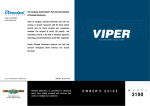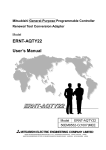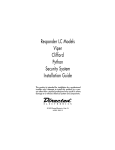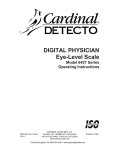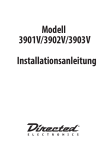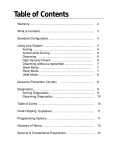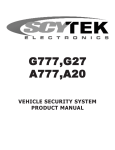Download Directed Electronics 3100 Instruction manual
Transcript
The company behind Viper® Auto Security Systems is Directed Electronics. Vista, CA 92081 www.viper.com Since its inception, Directed Electronics has had one purpose, to provide consumers with the finest vehicle security and car stereo products and accessories available. The recipient of nearly 100 patents ® and Innovations Awards in the field of advanced electronic technology, Directed Electronics is ISO 9001 registered. NO ONE DARES COME CLOSE Quality Directed Electronics products are sold and serviced throughout North America and around the world. © 2011 Directed Electronics. All rights reserved. Directed Electronics is an ISO 9001 registered company. G3100V BL 2011-03 Directed Electronics is committed to delivering world class quality products and services that excite and delight our customers. O W N E R’ S GUIDE M O D E 3100 L Congratulations Congratulations on the purchase of your state-of-the-art security system. Reading this Owner’s Guide prior to using your system will help maximize the use of your system and its many features. For more information please visit us online at: www.viper.com For additional questions please contact your authorized Directed dealer. Additional support is also available at: http://support.directed. com What you get s s s s A control module (installed) Two 3-button remote controls A registration card This owner’s guide AUX AUX er’s Own e u G id Registration Card Replacement remote controls If additional remote controls (P/N 473V) are desired, please see your authorized dealer or visit us at www.directedstore.com to order. G3100V BL 2011-03 © 2011 Directed Electronics. All rights reserved. i Contents Congratulations ................................................................................................... i What you get ....................................................................................................... i Getting Started.................................................................................................... 2 Keys to using this manual...................................................................... 2 System Maintenance ............................................................................ 2 Battery Disposal .................................................................................. 2 Remote Control ................................................................................................... 3 Using your System ............................................................................................... 4 Arm ................................................................................................... 4 Disarm ............................................................................................... 4 AUX Channel 2 ................................................................................... 4 Panic.................................................................................................. 5 Silent Arm/Disarm ............................................................................... 5 AUX Channel 3 ................................................................................... 5 Alarm Features ................................................................................................... 6 Armed Protection ................................................................................. 6 Emergency Override ............................................................................ 7 Trigger Zone Fault Report...................................................................... 7 Alarm Report....................................................................................... 7 Nuisance Prevention Circuitry (NPC) ...................................................... 8 Remote and System Operations ............................................................................ 9 Passive Arming .................................................................................... 9 Valet Mode ......................................................................................... 9 Comfort Closure ................................................................................ 10 Code Hopping Technology ................................................................. 10 Glossary of Terms.............................................................................................. 10 Government Regulations .................................................................................... 11 Additional Information ....................................................................................... 12 Interference ....................................................................................... 12 Upgrades ......................................................................................... 12 Water/Heat Resistance ...................................................................... 12 Español ............................................................................................................ 13 © 2011 Directed Electronics. All rights reserved. 1 Getting Started Keys to using this manual Specific actions (in bold type) and style conventions are used consistently throughout this manual, they are as follows: s Press: implies pushing in and releasing a button. s Hold: is used when a button needs to be held in position for an extended period of time, typically several seconds. s Italicized words denote section/sub headings in this guide and can be located through the table of contents. s An asterisk (*) when used after a word or phrase denotes that additional details can be found in related sections usually noted at the bottom of the page or end of the section. System Maintenance Your vehicle security system has no specific maintenance requirements. The remote control is powered by a 3-volt lithium battery (P/N CR2032) that will last approximately one year under normal use. When the battery begins to weaken, the LED on the remote control will dim and you will notice reduced operating range when using the remote control. Battery replacement: Locate the small slot on the side of the remote control. Insert a small slotted screwdriver or equivalent tool into slot and pry the case apart. Replace battery while verifying the correct polarity and then snap case together Battery Disposal Directed Electronics cares about the environment. If you need to dispose of the battery, please do so in accordance with your municipal requirements for battery disposal. 2 © 2011 Directed Electronics. All rights reserved. Remote Control AUX Feature Description Transmit LED Active when transmitting information Activates the Arm/Disarm function and Panic On/Off AUX Activates Auxiliary Channel 2 output Activates Panic + AUX Activates Auxiliary Channel 3 output © 2011 Directed Electronics. All rights reserved. 3 Using your System Arm Press and release . The alarm arms, doors lock (if connected), and the siren chirps and parking lights flash once. If Valet mode* is On, the doors lock without siren chirps, the alarm is disabled. Exit Valet mode to arm the alarm normally. If a trigger zone fault is detected the siren chirps once again and the Status LED generates a Trigger Zone Fault report**. Disarm When the system is already armed, Press and release . The alarm disarms, doors unlock (if connected), and the siren chirps and parking lights flash twice. An Alarm Report** alert of 4 or 5 siren chirps will replace the normal disarm chirps if the alarm was triggered. AUX Channel 2 Press and hold AUX . The Trunk opens (if connected) when this button is pressed for 2 seconds. 4 © 2011 Directed Electronics. All rights reserved. Panic Press and hold or . If you are threatened in or near your vehicle, you can trigger Panic output on your security system to attract attention. The siren will sound and the parking lights will flash for 30 seconds. Press and release again to stop the output. Silent Arm/Disarm Press and release AUX, then press and release . The system arms or disarms without chirping the siren. To permanently turn off the arm and disarm chirps, contact your installation dealer. Note Silent Arming also bypass the Sensor Warn-away output**. AUX Channel 3 Press and release + AUX. The Channel 3 output will pulse to activate connected accessory modules. Press and hold the button, the output remains active until the button is released (for a maximum of 30 seconds). * See Remote and System Operations for details. ** See Alarm Features for details. © 2011 Directed Electronics. All rights reserved. 5 Alarm Features Armed Protection Status LED: The Status LED flashes as a visual indicator that your vehicle’s security system is active. Starter Kill: The Failsafe starter kill relay prevents the engine from starting. Note May require additional parts and installation Sensor triggers: The onboard shock sensor can distinguish minor impacts from major impacts to the vehicle exterior. Minor impacts causes the system to emit a Warn-away output. Major impacts caused for example by a forcible entry attempt, results in a Full Trigger output. Point of entry triggers: Opening the hood or trunk causes a Full Trigger output, while opening a Door or turning on the Ignition causes the siren to chirp 3 seconds before beginning the Full Trigger output. This 3 second delay allows time to disarm and silence the siren in case of accidental trigger. Sensor Warn-away output: When the system sensors detect a Warnaway, it triggers the siren chirps and the parking lights flash for 3 seconds. Full Trigger output: An alarm Full Trigger sounds the siren and flashes the parking lights for 30 seconds. 6 © 2011 Directed Electronics. All rights reserved. Emergency Override The following procedure disarms the system when a programmed remote is not available. 1. Turn the ignition On. 2. Press and release the Valet button once. 3. The siren output ceases and the system is disarmed. Note As a precaution, if programmed for Passive Arming the system should be placed into Valet Mode until a remote is available. Trigger Zone Fault Report When armed by remote command the system runs a status check of the alarm trigger zones (see Table of Zones on next page). Open zones (usually caused by dome light delay or open trunk) are bypassed and reported via the status LED, while all other trigger zones remain active and are monitored to protect the vehicle. Should an open zone self correct (such as dome light turns off), it becomes active and is then monitored normally. The siren chirps once again a few seconds following the arming chirps as an audible alert, and the status LED flashes in groups to indicate the zone number. Alarm Report If the alarm was triggered while armed, it will be reported when the alarm is disarmed via siren chirps, parking light and status LED flashes. The siren chirps 4 times (or 5 times if NPC On, See Nuisance Prevention (NPC) on next page), the parking lights flash 3 times, and the status LED flashes in groups to indicate the last two zones that were triggered (see Table of Zones on next page). The report output will repeat for each disarm operation until the ignition is turned on. © 2011 Directed Electronics. All rights reserved. 7 Table of Zones Zone # (led flashes) Zone Name 1 Trunk/Sensor 2 2 Shock Sensor 3 Door 5 Ignition Note: The Warn-away trigger does not report on the LED. Nuisance Prevention Circuitry (NPC) NPC monitors all alarm zones and, if any are triggered excessively, bypasses them until corrected. If a point of entry (trunk, hood, door) is left open following a forced entry, it is bypassed. It becomes active again only after being closed. Bypassed sensors automatically reset after one hour, and after the vehicle is driven. Disarming then re-arming the alarm does not reset bypassed sensors. 8 © 2011 Directed Electronics. All rights reserved. Remote and System Operations Passive Arming Park and exit the vehicle, after the doors are closed the Passive arming countdown begins. The led flashes quickly and after 30 seconds the system arms itself. Anytime before the system arms you can re-enter the vehicle or open the trunk to load or unload items and, after closing passive arming resumes. To stay secure in case of accidental disarming the system, if a door is not opened within 30 seconds the system re-arms itself. Note: This is a programmable option. Valet Mode Valet mode can be entered and exited by performing the Remote Valet command or manually using the vehicle key and the valet button. Valet Mode defeats the alarm features while the convenience features still operate normally. Use 1. 2. 3. the following steps to manually enter and exit Valet Mode: Turn the ignition On and then Off Immediately press and release the valet button once The status LED turns On when entering and Off when exiting. You can also enter or exit Valet Mode by using the remote: 1. Open any vehicle door. 2. Press and then press AUX. Press again. The LED system status indicator lights solid when you enter Valet Mode and turns off when you exit Valet Mode. © 2011 Directed Electronics. All rights reserved. 9 Comfort Closure The optional Comfort Closure feature imitates turning the key in the door cylinder or holding the lock button of an Original Equipment Manufacturer (OEM) keyless entry. It will automatically close the windows and sunroof on vehicles with this type of OEM convenience feature. Code Hopping Technology Code Hopping Technology has been developed to increase the security of the unit. If buttons on the remote are pressed many times when out of range, or the battery is removed, the remote may get temporarily out of sync and fail to operate the system. To re-synchronize the remote, press several times within range of the vehicle. The system will automatically re-synchronize and the remote will respond normally. Glossary of Terms Document Terminology 10 Control Module The “brain” of your system. Usually hidden underneath the dash area of the vehicle. It houses the microprocessor which monitors your vehicle and controls all of the system’s functions. Remote Control A hand-held, remote control which operates the various functions of your system. Status LED A light used to indicate the status of your system. Valet Button A small push button located in your vehicle. It is used to override (disarm) the alarm when a remote is not available or to enter or exit Valet Mode. © 2011 Directed Electronics. All rights reserved. Government Regulations This device complies with Part 15 of FCC rules. Operation is subject to the following two conditions: (1) This device may not cause harmful interference, and (2) This device must accept any interference received, including interference that may cause undesirable operation. This equipment has been tested and found to comply with the limits for a class B digital device, pursuant to Part 15 of the FCC Rules. These limits are designed to provide reasonable protection against harmful interference in a residential installation. This equipment generates and can radiate radio frequency energy and, if not installed and used in accordance with the instruction manual, may cause harmful interference to radio communications. However, there is no guarantee that interference will not occur in a particular installation. If this equipment does cause harmful interference to radio or television, which can be determined by turning the equipment OFF and ON, the user is encouraged to try to correct the interference by one or more of the following measures: s s s s Reorient or relocate the receiving antenna. Increase the separation between the equipment and receiver. Connect the equipment into an outlet on a circuit different from that to which the receiver is connected. Consult the dealer or an experienced radio / TV technician for help. Remote Controls To satisfy FCC RF exposure compliance requirements, this device should be used in hand-held, hand operated configurations only. The device and its antenna must maintain a separation distance of 20 cm or more from the person’s body, except for the hand and wrists, to satisfy RF exposure compliance. This device is designed to be used in a person’s hands and its operating configurations do not support normal transmissions while it is carried in pockets or holsters next to a person’s body. © 2011 Directed Electronics. All rights reserved. 11 Additional Information Interference All radio devices are subject to interference which could affect proper performance. Upgrades Any upgrades to this product must be performed by an authorized Directed dealer. Do not attempt to perform any unauthorized modifications to this product. Water/Heat Resistance This product is not designed to be water and/or heat-resistant. Please take care to keep this product dry and away from heat sources. Any damage from water or heat will void the warranty. 12 © 2011 Directed Electronics. All rights reserved.














